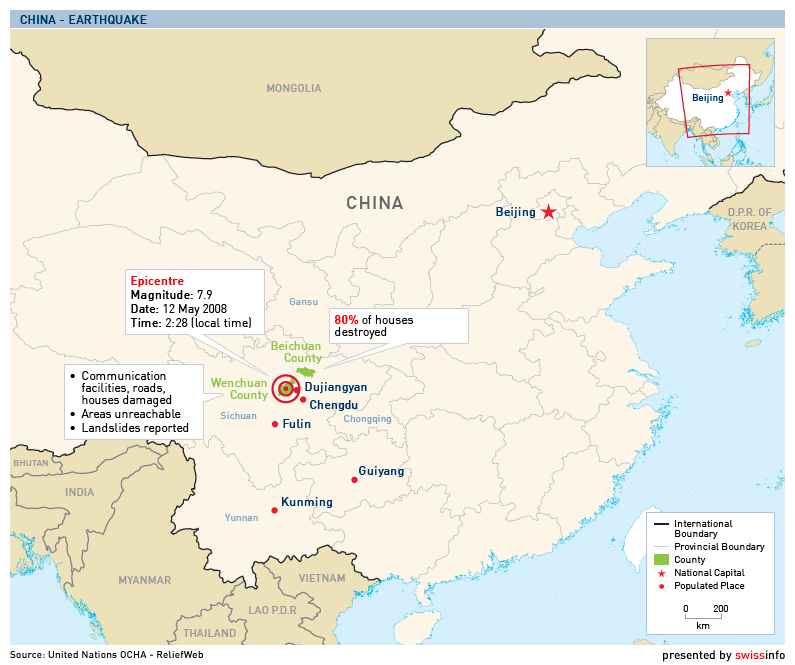
Swiss aid workers out in the cold in Sichuan

Reconstruction is proving difficult in the Chinese province of Sichuan following May's earthquake, according to Swiss on the ground.
Immediately after the disaster, which left at least 70,000 dead with tens of thousands still missing, the Swiss government offered as much help as it could muster. But China turned down Swiss offers of aid – apart from a thousand large tents.
Indeed, Switzerland had not waited for disaster to strike. Since a half of all earthquake victims in the world are Chinese, two years ago the foreign ministry set up a course in Beijing to train emergency rescue workers, including in the use of dogs and other facilities.
So when the earthquake struck, the small group of Chinese specialists whom they had trained went to help out in Sichuan. The Swiss, and their dogs, were left behind.
Beijing had initially accepted Bern’s offer of help. A plane was standing by at Zurich airport, laden with equipment, engineers, rescue workers and doctors.
But at the last minute the flight was cancelled. The reason given by Beijing was lack of safety, aftershocks and landslides. The Chinese were glad to accept money and tents, but not personnel.
The Swiss were somewhat surprised, but said nothing. They simply sent over a thousand tents.
In recent weeks the reluctance to accept foreign aid has increased. Foreigners, who were tolerated in the worst affected regions in the immediate aftermath of the disaster, are now definitely not wanted.
The army is refusing entry to non-Chinese, journalists or not, who want to go to Hongkou, close to the epicentre. NGOs who have a small presence on the ground now are wondering if they are going to be able to stay. Most of them are unable to leave Chengdu, the provincial capital.
Hidden destruction
Although thousands of houses collapsed during the quake, many buildings are still standing. In Dujiangyan, for example, 60 kilometres northwest of Chengdu, a block of flats collapsed in the main street but the buildings opposite appear to be intact.
But that is an illusion.
Recently built three and four-storey houses look as if their foundations are solid. But closer inspection shows that the interiors are nothing but a heap of rubble: the load-bearing walls are cracked, and all the rest has gone. The houses are no longer habitable.
Swiss geologist Beat Kunzi, who is in charge of the humanitarian programme at the Swiss embassy in Beijing has just visited the mountainous area around the town of Guangyuan, on the northeast edge of the quake-hit area.
He saw and photographed a number of new buildings with cracks that to the uninitiated may not appear too serious. He disagrees.
“Of course, it isn’t my decision. But in my opinion all these buildings have become too dangerous and need to be demolished,” he told swissinfo.
Army deployment
For Beijing the only useful actor in the quake zone is the army. Kunzi has seen it at work and agrees that it has been very efficient.
But the Communist Party has chosen to use it for propaganda purposes. Every day television shows lengthy ceremonies honouring the troops, with poignant images from the affected area.
The aim of the daily campaign is also to make people forget revelations that many of the schools collapsed because safety norms had been ignored when they were built. This is another reason to keep foreign aid workers and journalists out of towns where parents are mourning children killed when their schools collapse on top of them and who make no attempt to hide their anger.
In Dujiangyan, the Wen family, living in a blue tent city in the centre of town, has no major complaints. They have not lost a child, and their school is about to re-open. They say the government has kept its promises and is providing the basic necessities.
“What we lack is work,” Mrs Wen told swissinfo, setting her wok down on a camping stove. But life in the tent in the hot summer sun will soon become impossible. Prefabricated huts are already replacing the camps, and in a few weeks’ time the little bit of Swiss aid will be no more than a memory.
swissinfo, based on an article in French by Alain Campiotti in Sichuan
A quake measuring 7.9 on the Richter scale struck Wenchaun County in China’s Sichuan Basin at 2.28pm Beijing time (6.28pm) on May 12.
The earthquake struck 29 km below the earth’s surface, with the epicentre located 92 km from Chengdu, the provincial capital.
Tremors were reported throughout China and as far away as Bangkok, the capital of Thailand, and in Vietnam.
Major aftershocks in nearby areas in late May also destroyed thousands of buildings.


In compliance with the JTI standards
More: SWI swissinfo.ch certified by the Journalism Trust Initiative

























You can find an overview of ongoing debates with our journalists here . Please join us!
If you want to start a conversation about a topic raised in this article or want to report factual errors, email us at english@swissinfo.ch.